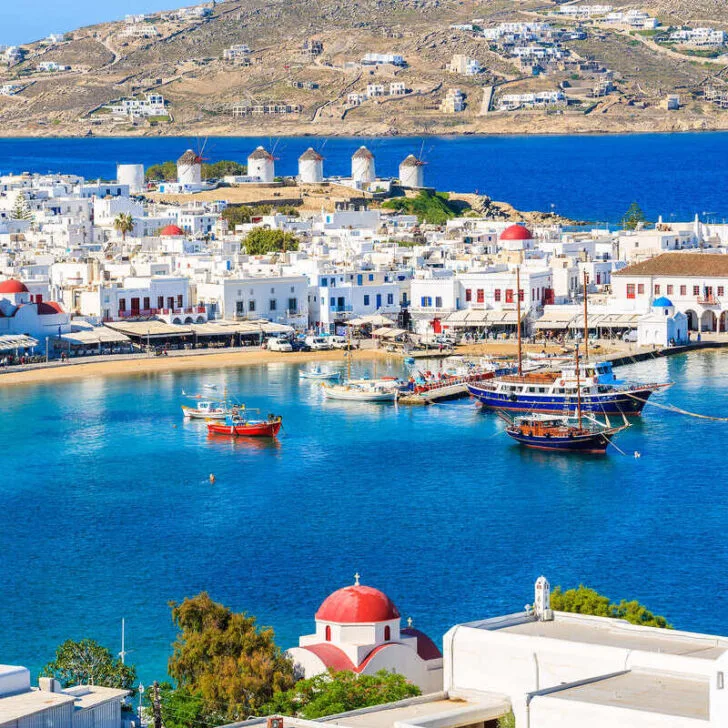Since the last few years have pushed people out of the office and into remote work, numerous sunny destinations worldwide have been witnessing a surge in digital nomads.
Countries like Mexico (home to over 1.6 million Americans), Brazil, and Colombia have flung their doors open to remote workers, and Indonesia, Thailand, and Singapore are rising in prominence as entrepreneurial hubs and are leading the nomad trend.
There’s never been this many opportunities nor incentives for you to relocate, especially when there is a plethora of Digital Nomad Visas (DNVs) in the market and easy-to-fulfill requirements, but this one country is actually calling on nomads to move there.
One of the oldest nations in Europe and the cradle of Western civilization, it is famous for its rugged beauty, paradisaical islands, millennia-old monuments and vibrant coastal cities:
Why Greece Wants You To Move There
Greece has always been one of Europe’s most popular beach destinations.

Occupying the Southern tip of the Balkan peninsula, as well as administering up to 227 inhabited islands in the bright-blue Aegean Sea, it is best known for its ancient heritage – think the Athenian Parthenon, or the temples in Delphi – and subtropical climate.
Greece truly requires no introduction.
We are sure you have studied it extensively in school, or you’re at the very least familiar with the culture, some of the major Greek feats, including the birth of democracy, the Olympic Games, and Greek food.

Every year, tens of millions of tourists land in the Eastern Mediterranean country in hopes of seeing iconic Hellenic landmarks with their own eyes, hopping around whitewashed islands, or sailing into an Aegean sunset as they sip on some Assyrtiko wine.
A less-known fact about Greece, however, is that other than being a world-class tourist destination, it has been making headlines lately as a digital nomad hotspot, with the Government actively encouraging nomads to move there.
But how?

Greece Has Launched A Digital Nomad Visa
Last year, Greece officially launched its Digital Nomad Visa, enabling non-European nomads to relocate to the country on a more defined, safer migration route.
Upon its release, we covered the topic extensively and even listed the pros and cons of applying for the Greek DNV, not one of the easiest or most affordable to obtain in the market, but certainly one of the most valuable.
With a Greek DNV, you can stay in the country for longer than 90 days out of any 180-day period, as long as your visa is valid and you are not bound by Schengen Area entry or exit rules nor affected by the incoming travel permit that will apply to tourists.

On the other hand, you will be required to provide sufficient proof of funds to support yourself while in Greece, and this can be as high as €3500 a month – meanwhile, countries like Colombia allow nomads earning as little as US$684 a month to get a DNV.
Still, remote workers have been flocking to Greece, as it boasts a higher level of public safety, higher living standards, and comparably great weather (with the exception of the mild Mediterranean winter).
So far, as many as 1,693 DNVs have been issued to foreigners in Greece, making it a highly sought-after European destination for remote work.

You may be wondering why, as it can be incredibly expensive, particularly on the islands, where the tourism sector caters almost exclusively to a high-spending clientele, and overnight rates can cost as high as US$1,379 per night.
Needless to say, budget-conscious nomads are not basing themselves in Santorini, Mykonos, Rhodes, or Corfu, though the latter is wooing foreign visitors, for that matter.
Consumer prices offshore may be sky-high, but that is not necessarily the case in the mainland.

Greece Is Not As Expensive As One Might Think
Athens has a relatively low cost of living, with a single person’s monthly expenses in the capital estimated at US$864.70 without rent, making it, on average, 23.8% less expensive than Paris, yet another hugely popular nomad spot.
Rent in Athens can also be up to 60.8% lower than in Northwestern Europe, and nomads are able to find excellent long-term rental deals starting from €250 for a studio apartment away from the city center, going as high as €650 for a conveniently located, central flat.

All major Greek cities also have a plethora of work-friendly cafes and co-working offices nomads can access, with NomadList listing as many as 50 in the capital region alone and 28 in Thessaloniki, Greece’s overlooked, second-largest city and one of its fastest-growing destinations.
Other major urban areas where nomads are offered great infrastructure, easy transport links, and an inestimable cultural wealth include Patras in the Western mainland, Heraklion, the multicultural capital of the island of Crete, and Larissa, a large, historically-charged city in Thessaly.

American Nomads Love Greece
Interestingly enough, a large proportion of DNV applicants are coming from the States.
Second only to Ukrainians, who are choosing to emigrate en masse to Greece on Digital Nomad Visas amid the ongoing Russo-Ukrainian War, Americans are the second most popular nationality applying for residency permits on this basis, followed by Britons, Israelis, Brazilians, and the Lebanese.
Learn more about Greece – and which are some of the country’s most beautiful destinations – here.
Credit: Source link

